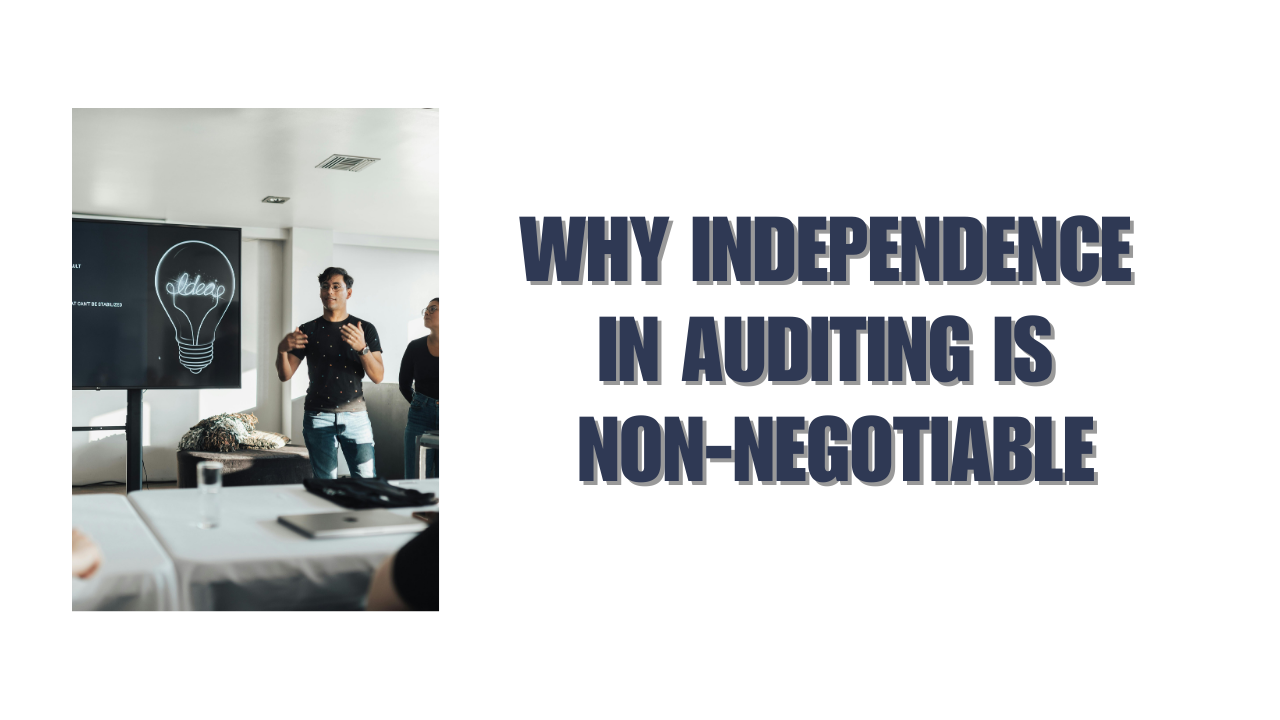In the corporate world, trust is the currency of business. Investors, boards, and regulators rely on accurate financial information to make informed decisions. Audits provide this assurance, but their value hinges on a critical factor: independence in auditing. Without independence, even the most detailed financial reports lose credibility, and stakeholder confidence erodes.
For executives and boards, understanding why auditor independence is non-negotiable is essential for safeguarding reputation, ensuring compliance, and driving long-term business resilience.
What Is Independence in Auditing?
Independence in auditing refers to the auditor’s ability to perform their duties without bias, conflict of interest, or undue influence from management. It ensures that audit conclusions are objective, accurate, and reliable.
Independence has two dimensions:
- Independence of Mind: The auditor maintains impartial judgment, free from personal or external pressures.
- Independence in Appearance: Stakeholders should perceive the auditor as unbiased, even if no actual conflict exists.
Both dimensions are crucial. An audit can fail its purpose if either the facts are compromised or stakeholders doubt the auditor’s objectivity.
Why Independence Is Critical
1. Ensures Objectivity
Auditors must provide unbiased assessments of financial statements and controls. Independence ensures that findings reflect reality, not management’s preferences or pressures. Without objectivity, reports may mislead investors, lenders, and regulators.
2. Maintains Stakeholder Confidence
Shareholders, investors, and boards depend on accurate, impartial information. Auditor independence reassures stakeholders that financial statements are trustworthy, reinforcing credibility and market confidence.
3. Reduces Risk of Fraud or Misstatement
Independent auditors are more likely to detect errors, fraud, or irregularities. A compromised audit increases the risk of undetected misstatements, which can lead to financial loss, regulatory penalties, and reputational damage.
4. Supports Regulatory Compliance
Many regulatory frameworks, such as the Sarbanes-Oxley Act, explicitly mandate auditor independence. Compliance with these rules protects companies from legal consequences and aligns with global best practices.
5. Strengthens Corporate Governance
Audits are a cornerstone of governance. Independent audits provide boards and executives with reliable information, enabling better decision-making, risk management, and strategic oversight.
Threats to Auditor Independence
Maintaining independence is not automatic-it requires constant vigilance. Common threats include:
- Financial Relationships: Auditors holding financial interests in a client can compromise objectivity.
- Management Pressure: Attempts to influence audit findings or tone of reports undermine independence.
- Familiarity Threat: Long-term relationships with clients may lead to complacency or bias.
- Provision of Non-Audit Services: Offering consulting or advisory services to audit clients can create conflicts of interest.
Recognizing these threats allows companies and auditors to implement safeguards, preserving the integrity of the audit process.
Safeguarding Independence in Auditing
Several measures ensure independence remains intact:
1. Rotation of Audit Teams
Periodic rotation of key audit personnel reduces familiarity risk and reinforces objectivity.
2. Clear Governance Policies
Formal policies define permissible relationships and activities, preventing conflicts of interest.
3. Segregation of Services
Auditors should avoid providing non-audit services to audit clients to prevent self-review threats.
4. Oversight and Peer Reviews
Independent review of audit work by external teams strengthens accountability and credibility.
5. Ethical Training and Standards
Regular training on ethical standards reinforces auditors’ commitment to independence and objectivity.
Consequences of Compromised Independence
When independence is compromised, the impact can be severe:
- Financial Loss: Investors may make decisions based on inaccurate reports, resulting in significant losses.
- Regulatory Penalties: Non-compliance with independence rules can trigger fines or legal action.
- Reputational Damage: Public trust in the company and its auditors may deteriorate.
- Operational Disruption: Corrective audits and reviews are costly and time-consuming.
High-profile corporate failures, such as Enron and WorldCom, illustrate how compromised auditor independence can contribute to systemic financial disasters. These cases underscore why independence is non-negotiable in every audit.
Role of Boards and Management
Boards and management play a critical role in protecting auditor independence:
- Promoting a Culture of Integrity: Encourage transparency and ethical behavior throughout the organization.
- Selecting Independent Audit Firms: Choose auditors with a strong track record and no conflicts of interest.
- Providing Access Without Influence: Facilitate the audit process while respecting auditor autonomy.
- Monitoring Compliance: Ensure auditors adhere to independence standards and professional guidelines.
By supporting independent audits, leadership not only ensures compliance but also strengthens stakeholder confidence and corporate governance.
Benefits of Upholding Independence
Maintaining independence delivers tangible value:
- Credible Financial Reporting: Stakeholders can trust reported figures and analyses.
- Enhanced Investor Confidence: Transparent reporting attracts investment and supports business growth.
- Risk Reduction: Independent audits identify vulnerabilities before they escalate into crises.
- Regulatory Assurance: Compliance with global audit standards reduces the risk of legal and financial penalties.
- Strategic Decision-Making: Reliable data empowers leadership to make informed, forward-looking decisions.
Independence transforms audits from a procedural requirement into a strategic advantage for the organization.
Conclusion
Independence in auditing is non-negotiable because it underpins the credibility, accuracy, and reliability of financial reporting. It ensures auditors remain impartial, protects stakeholders, strengthens corporate governance, and mitigates risk.
At Aurora Financials, we prioritize auditor independence in every engagement. By combining ethical rigor, technical expertise, and transparent processes, we help organizations ensure their audits deliver maximum value. In today’s complex business environment, independence is not just a standard-it is the foundation of trust, accountability, and sustainable growth.






